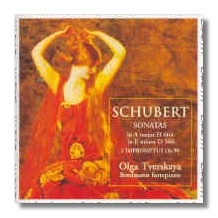
The Internet's Premier Classical Music Source
Related Links
- Schubert Reviews
- Latest Reviews
- More Reviews
-
By Composer
-
Collections
DVD & Blu-ray
Books
Concert Reviews
Articles/Interviews
Software
Audio
Search Amazon
Recommended Links
Site News
 CD Review
CD Review
Franz Schubert

- Sonata in E minor, D. 566
- Sonata in A Major, D. 664
- Impromptu in G Flat Major, Op. 90 #3
- Impromptu in A Flat Major, Op. 90 #4
Olga Tverskaya, fortepiano
Opus 111 30193 LC5718 57 mins
Olga Tverskaya is a formidably equipped prize-winning Russian trained pianist who switched to early pianos at the Guildhall School in London. Her own favoured instrument, a Broadman fortepiano of 1823 copied by David Winston in 1995 has a larger and richer sonority than some other fortepianos and I was vastly impressed by hearing her on it in chamber versions of Mozart concertos with Sonnerie (I hope they may be able to record them together).
Olga Tverskaya is often asked how she could have adapted her playing to the fortepiano, its predecessor from another age. Her explanation is so important that I reproduce an excerpt here:
"My view is that the fortepiano is the only surviving witness of how Schubert's works actually sounded, and so it is the most reliable guide for my interpretations.By trusting the instrument entirely and never imposing upon it, I let it tell me which tempos and dynamics are most appropriate to the style of the piece I wish to play. With its enormous range of colours, its warm, singing, yet deep and powerful sound, the instrument itself gives vivid insight into the phrases, forms and contrasts as well as the atmospheres Schubert had in mind when composing. Because the instrument is so evocative, a strong sense of intimacy has grown up between me and the music Schubert wrote, to such an extent that I feel I am close to him, that he and I share feelings and thoughts with the listener."
It is a wonderful recording, the playing vividly alive and the sonorities making you hear familiar music anew, and always convincingly 'right'. I endorse Olga Tverskaya's high claims and it makes for another blow in my personal campaign in support of what many will consider an extreme opinion in my review of an Early Music Weekend at Greenwich - "Performances on modern string and wind instruments, and on the ubiquitous Steinway grand, will soon come to seem anachronistic and belonging 'historically' to the twentieth century".
Copyright © 2003, Peter Grahame Woolf


















